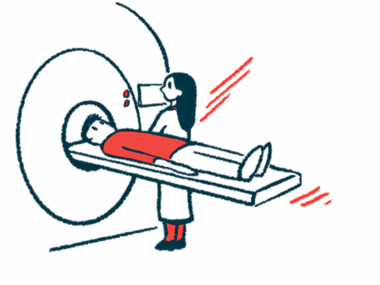Cleveland Clinic Researchers Find iPad A Powerful Multiple Sclerosis Assessment Tool
Written by |

Tracking patients’ progress is a critical part of MS management, a process that can benefit from greater objective analysis. Researchers at the Cleveland Clinic have determined that tablet computers, which feature built-in technologies like accelerometers, gyroscopes, and touchscreens, when combined with appropriate software, can provide pretty good MS assessment capabilities.
In a new Open Access paper published in the Journal of Visualized Experiments (JoVE), the Cleveland Clinic research team report that they used an Apple iPad as a tool to perform an array of performance tests relevant to MS assessment. By attaching the iPad to the back of a patient while having her walk and balance, the app within provides precise data on posture.
 A specially built attachment that sits on the top of the iPad’s screen allows for dexterity testing using metal pegs. The patient moves pegs between different holes as requested by a therapist and the iPad software tracks the timing of the pegs being moved, translating that into an objective evaluation of dexterity.
A specially built attachment that sits on the top of the iPad’s screen allows for dexterity testing using metal pegs. The patient moves pegs between different holes as requested by a therapist and the iPad software tracks the timing of the pegs being moved, translating that into an objective evaluation of dexterity.
The iPad model used in this study was the iPad with Retina Display (16 GB, Wi-Fi, White – 4th generation (MD513LL/A) which is Apple’s current entry-level full-size iPad.
An eye test is also included that analyzes low contrast vision, along with a simple cognitive processing test to provide insight on how well the brain is working.
The JOVE paper, entitled “The Multiple Sclerosis Performance Test (MSPT): An iPad-Based Disability Assessment Tool?” (6/30/2014, Issue 88; doi: 10.3791/51318), is coauthored by Richard A. Rudick, Deborah Miller, Francois Bethoux, Darlene Stough, and Bernadett Mamone of the Mellen Center for Multiple Sclerosis Treatment and Research, Cleveland Clinic Foundation; Stephen M. Rao and Christine Reece of the Center for Brain Health, Cleveland Clinic Foundation, Jar-Chi Lee of Quantitative Health Sciences, Cleveland Clinic Foundation; and David Schindler and Jay Alberts of the Department of Biomedical Engineering, Lerner Research Institute, Cleveland Clinic Foundation.
In the report, they document high precision, strong correlations between MSPT component test results and the analogous technician-based testing, and favorable sensitivity in distinguishing MS from controls, and mild from severe MS, as well as significant correlation between patient reports and MSPT testing of walking and hand function. In all comparisons, MSPT testing compared favorably to technician-based testing. Finally, they document high test subject acceptance of the iPad based testing.
 The coauthors note that precise measurement of neurological and neuropsychological impairment and disability in multiple sclerosis is challenging for a variety of reasons. First, clinical manifestations vary widely in different MS patients. Second, disease activity varies significantly over time in individual MS patients. Third, MS manifestations vary in early compared with late disease stages. Lastly, neurological and neuropsychological impairment and disability are inherently difficult to quantify. They report a new test: “the Multiple Sclerosis Performance Test” (MSPT), which represents a new approach to quantifying MS related disability. The MSPT takes advantage of advances in computer technology, information technology, biomechanics, and clinical measurement science, and represents a computer-based platform for precise, valid measurement of MS severity.
The coauthors note that precise measurement of neurological and neuropsychological impairment and disability in multiple sclerosis is challenging for a variety of reasons. First, clinical manifestations vary widely in different MS patients. Second, disease activity varies significantly over time in individual MS patients. Third, MS manifestations vary in early compared with late disease stages. Lastly, neurological and neuropsychological impairment and disability are inherently difficult to quantify. They report a new test: “the Multiple Sclerosis Performance Test” (MSPT), which represents a new approach to quantifying MS related disability. The MSPT takes advantage of advances in computer technology, information technology, biomechanics, and clinical measurement science, and represents a computer-based platform for precise, valid measurement of MS severity.
They observe that conducting neurological performance testing within the computer environment enables various direct manipulations and analyses of primary and derivative data. Moreover, results can be directly transmitted to research or clinical data repositories without paper or electronic case report forms, substantially reducing the need for manual data quality checks, the cost of transcribing data manually, with reduced potential for human error. In aggregate, these advantages should translate into improved efficiency and data quality.
The study was conducted at a single site — The Mellen Center for Multiple Sclerosis Treatment and Research at the Cleveland Clinic. Fifty-one MS patients representing a range of neurological disability and disease duration, and 49 age and gender matched HC were recruited for a single study visit. The inclusion criteria were as follows: healthy controls willing to participate in MSPT validation or a diagnosis of MS by International Panel Criteria16, ages 18-65, able to understand the purpose for the study and provide informed consent; ambulatory and able to walk 25 ft, with or without ambulation assistive device. Subjects were well-matched for age, gender, race, and years of education. Disease duration in the MS patients, defined as time from first MS symptom, was 12.1 (9.1) years; EDSS was 3.9 (1.8); 74.5% were using MS disease modifying drugs; 29.4% had progressive forms of MS; and 43% were employed full-time.
[adrotate group=”4″]
 Reproducibility was tested for all measures by having each research subject perform each test twice, both during a morning test session, and during a second test session in the afternoon following a 2-4 hr rest period. Test-retest reproducibility was analyzed by inspecting visual plots, and by generating Concordance Correlation Coefficients.Concurrent validity was tested by comparing the technician and iPad based testing for each of the four dimensions using Pearson Correlation Coefficients.
Reproducibility was tested for all measures by having each research subject perform each test twice, both during a morning test session, and during a second test session in the afternoon following a 2-4 hr rest period. Test-retest reproducibility was analyzed by inspecting visual plots, and by generating Concordance Correlation Coefficients.Concurrent validity was tested by comparing the technician and iPad based testing for each of the four dimensions using Pearson Correlation Coefficients.
Based on, but extending the Multiple Sclerosis Functional Composite (MSFC), the MSPT provides precise, quantitative data on walking speed, balance, manual dexterity, visual function, and cognitive processing speed. The MSPT was tested by 51 MS patients and 49 healthy controls (HC). MSPT scores were highly reproducible, correlated strongly with technician-administered test scores, discriminated MS from HC and severe from mild MS, and correlated with patient reported outcomes. Measures of reliability, sensitivity, and clinical meaning for MSPT scores were favorable compared with technician-based testing.
A demonstration video can be accessed from the study site at:
https://bit.ly/1pJBGSJ
The researchers contend that MSPT is a potentially transformative approach for collecting MS disability outcome data for patient care and research. Because the testing is computer-based, test performance can be analyzed in traditional or novel ways and data can be directly entered into research or clinical databases. The MSPT could therefore be widely disseminated to clinicians in practice in settings not connected to clinical trial performance sites or who are practicing in rural settings, drastically improving access to clinical trials for clinicians and patients. Patients could be tested using the MSPT in a rural doctor’s office, potentially supporting participation in clinical trials for patients who might otherwise not be able to participate in a clinical trial simply because of distance. The MSPT could also be adapted to out of clinic settings, like the patient’s home, thereby providing more meaningful real world data. The MSPT represents a new paradigm for neuroperformance testing. This method could have the same transformative effect on clinical care and research in MS as standardized computer-adapted testing has had in the education field, with clear potential to accelerate progress in clinical care and research.
The MSPT could also be used in practice settings (e.g., MS clinics) to collect standardized neuroperformance information. Because the data is standardized and quantitative, MSPT could provide a highly cost-efficient mechanism to collect MS assessment data during routine clinical practice. This could populate research registries and inform practice-based research related to natural history, treatment, effects of co-morbidities, and various other important topics.
The researchers say it is important to note that the iPad is used as a platform to host the data collection and processing algorithms in the software. Much like other computerized testing approaches, the software was written in such a manner that should Apple or other tablet makers update the hardware or operating system, adjustments can be made in the acquisition and processing of the data to ensure that outcomes remain consistent across test modules and do not have to be re-validated under the future device or software configurations.
They conclude that as neuroperformance testing is increasingly applied in MS and other chronic neurological and neuropsychological disorders, computer-adapted testing will have the same transformative effect on clinical care and research as standardized computer-adapted testing has had in the education field, with clear potential to accelerate progress in clinical care and research for neurological disorders.
The coauthors acknowledge research funding for validation of the MSPT from Novartis Pharmaceutical Corporation, East Hanover, New Jersey.
Sources:
Cleveland Clinic
Journal of Visualized Experiments (JoVE)
Image Credits:
Journal of Visualized Experiments (JoVE)






